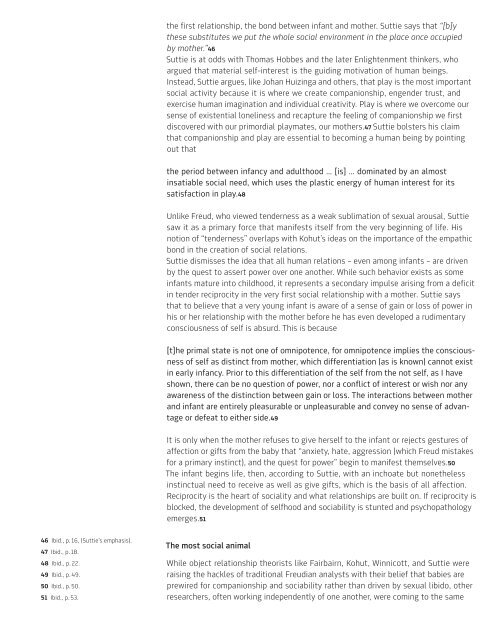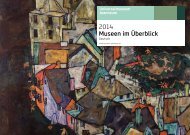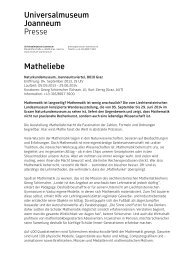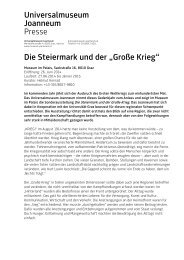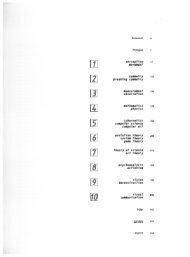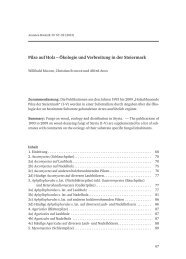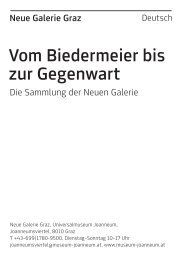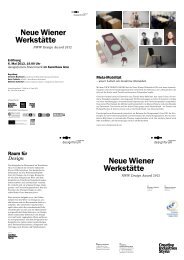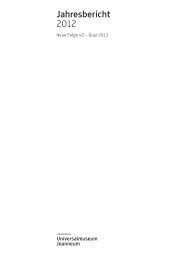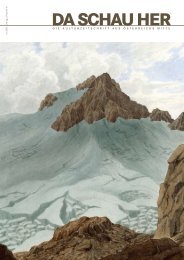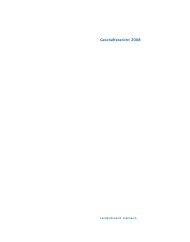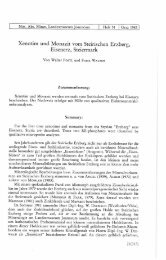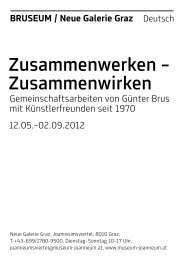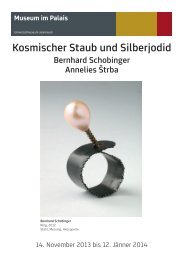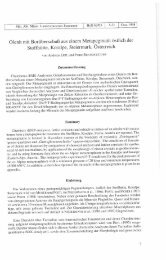Human Condition - Universalmuseum Joanneum
Human Condition - Universalmuseum Joanneum
Human Condition - Universalmuseum Joanneum
Erfolgreiche ePaper selbst erstellen
Machen Sie aus Ihren PDF Publikationen ein blätterbares Flipbook mit unserer einzigartigen Google optimierten e-Paper Software.
46 Ibid., p. 16, (Suttie’s emphasis).<br />
47 Ibid., p. 18.<br />
48 Ibid., p. 22.<br />
49 Ibid., p. 49.<br />
50 Ibid., p. 50.<br />
51 Ibid., p. 53.<br />
the first relationship, the bond between infant and mother. Suttie says that “[b]y<br />
these substitutes we put the whole social environment in the place once occupied<br />
by mother.”46<br />
Suttie is at odds with Thomas Hobbes and the later Enlightenment thinkers, who<br />
argued that material self-interest is the guiding moti vation of human beings.<br />
Instead, Suttie argues, like Johan Huizinga and others, that play is the most important<br />
social activity because it is where we create companionship, engender trust, and<br />
exercise human imagination and individual creativity. Play is where we overcome our<br />
sense of existential loneliness and recapture the feeling of companion ship we first<br />
discovered with our primordial playmates, our mothers.47 Suttie bolsters his claim<br />
that companionship and play are essential to becoming a human being by pointing<br />
out that<br />
the period between infancy and adulthood … [is] … dominated by an almost<br />
insatiable social need, which uses the plastic energy of human interest for its<br />
satisfaction in play.48<br />
Unlike Freud, who viewed tenderness as a weak sublimation of sex ual arousal, Suttie<br />
saw it as a primary force that manifests itself from the very beginning of life. His<br />
notion of “tenderness” overlaps with Kohut’s ideas on the importance of the empathic<br />
bond in the creation of social relations.<br />
Suttie dismisses the idea that all human relations – even among infants – are driven<br />
by the quest to assert power over one another. While such behavior exists as some<br />
infants mature into childhood, it represents a secondary impulse arising from a deficit<br />
in tender reci procity in the very first social relationship with a mother. Suttie says<br />
that to believe that a very young infant is aware of a sense of gain or loss of power in<br />
his or her relationship with the mother before he has even developed a rudimentary<br />
consciousness of self is absurd. This is because<br />
[t]he primal state is not one of omnipotence, for omnipotence implies the consciousness<br />
of self as distinct from mother, which differentiation (as is known) cannot exist<br />
in early infancy. Prior to this differentiation of the self from the not self, as I have<br />
shown, there can be no question of power, nor a conflict of interest or wish nor any<br />
awareness of the distinction between gain or loss. The interactions between mother<br />
and infant are entirely pleasurable or unpleasurable and convey no sense of advantage<br />
or defeat to either side.49<br />
It is only when the mother refuses to give herself to the infant or rejects gestures of<br />
affection or gifts from the baby that “anxiety, hate, aggression (which Freud mistakes<br />
for a primary instinct), and the quest for power” begin to manifest themselves.50<br />
The infant begins life, then, according to Suttie, with an inchoate but nonetheless<br />
instinctual need to receive as weIl as give gifts, which is the basis of all affection.<br />
Reciprocity is the heart of sociality and what relationships are built on. If reciprocity is<br />
blocked, the development of selfhood and sociability is stunted and psychopathology<br />
emerges.51<br />
The most social animal<br />
While object relationship theorists like Fairbairn, Kohut, Winnicott, and Suttie were<br />
raising the hackles of traditional Freudian analysts with their belief that babies are<br />
prewired for companionship and sociability rather than driven by sexual libido, other<br />
researchers, often working independently of one another, were coming to the same


